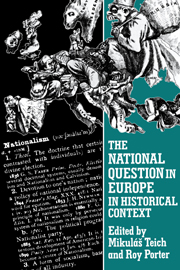Book contents
- Frontmatter
- Contents
- List of maps
- Notes on contributors
- Acknowledgements
- Introduction
- 1 The British Isles: Celt and Saxon
- 2 The making of the French nation
- 3 The national question in Italy
- 4 The roots of the national question in Spain
- 5 Shifting nationalism: Belgians, Flemings and Walloons
- 6 The nation in German history
- 7 Nationalism and nation-state in Germany
- 8 The national identity of the Austrians
- 9 The Czechs
- 10 The national question in Hungary
- 11 The union of Dalmatia with northern Croatia: a crucial question of the Croatian national integration in the nineteenth century
- 12 The national question in Poland in the twentieth century
- 13 Finland: from Napoleonic legacy to Nordic co-operation
- Index
3 - The national question in Italy
Published online by Cambridge University Press: 30 November 2009
- Frontmatter
- Contents
- List of maps
- Notes on contributors
- Acknowledgements
- Introduction
- 1 The British Isles: Celt and Saxon
- 2 The making of the French nation
- 3 The national question in Italy
- 4 The roots of the national question in Spain
- 5 Shifting nationalism: Belgians, Flemings and Walloons
- 6 The nation in German history
- 7 Nationalism and nation-state in Germany
- 8 The national identity of the Austrians
- 9 The Czechs
- 10 The national question in Hungary
- 11 The union of Dalmatia with northern Croatia: a crucial question of the Croatian national integration in the nineteenth century
- 12 The national question in Poland in the twentieth century
- 13 Finland: from Napoleonic legacy to Nordic co-operation
- Index
Summary
IN THE SHADOW OF FRANCE, 1796–1814
The Italian question did not exist as a political reality before 1796. The Italian Jacobins were the first to pose the creation of a united Italy as a concrete political project, and their concept of the nation was derived from the French Revolution. For the French revolutionaries, the nation was not a given; it had to be created. The historical heritage was irrelevant, even dangerous. Just this abstract quality of French nationalism favoured its transplantation into Italy, where the historical basis for a political concept of nationality was lacking. The adoption of this concept was also prepared by a shift in the meaning of the word patria and its derivatives. Originally used in a neutral sense to refer to a person's place of birth, or, at most, the state of which he was a subject, it became charged with a new political significance. The patria could only be an association of free citizens, and a patriot was someone who worked for the cause of freedom against despotism. Paradoxically, it was the universality of the new idea of patriotism which prepared the ground for a new idea of the nation, because it implied a refusal of the legitimacy of the existing absolutist states.
- Type
- Chapter
- Information
- The National Question in Europe in Historical Context , pp. 63 - 105Publisher: Cambridge University PressPrint publication year: 1993
- 11
- Cited by



